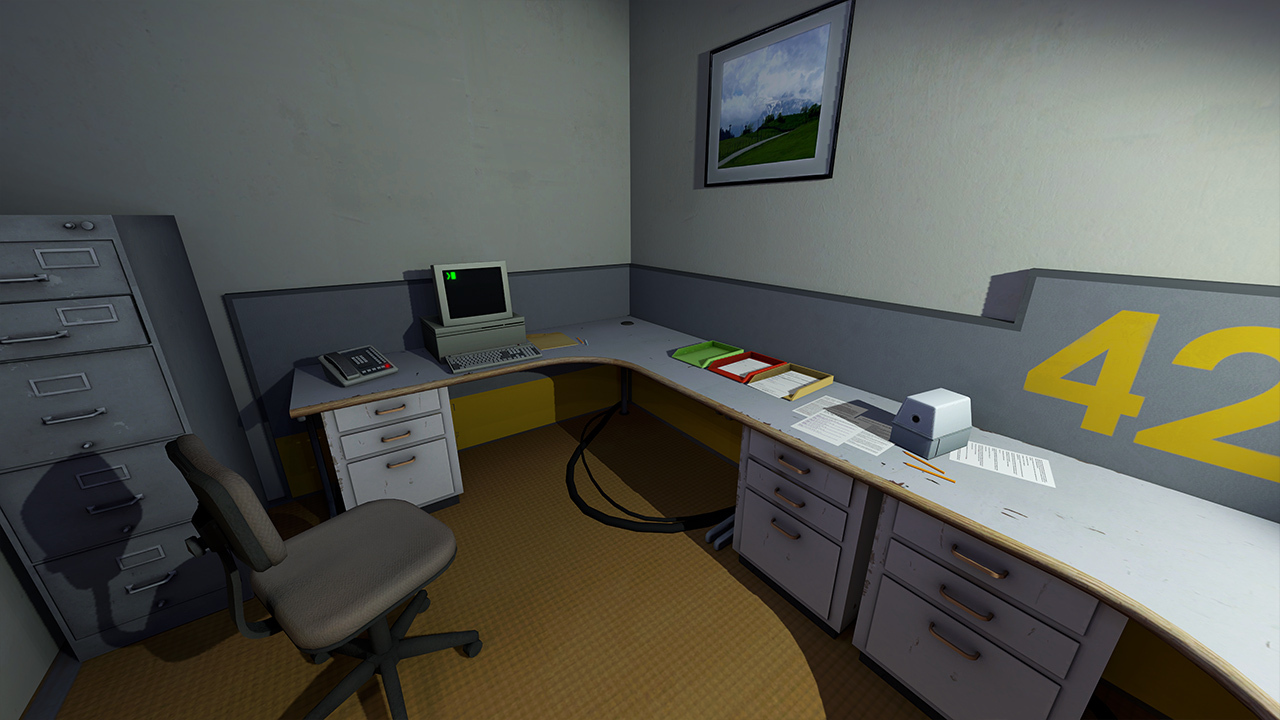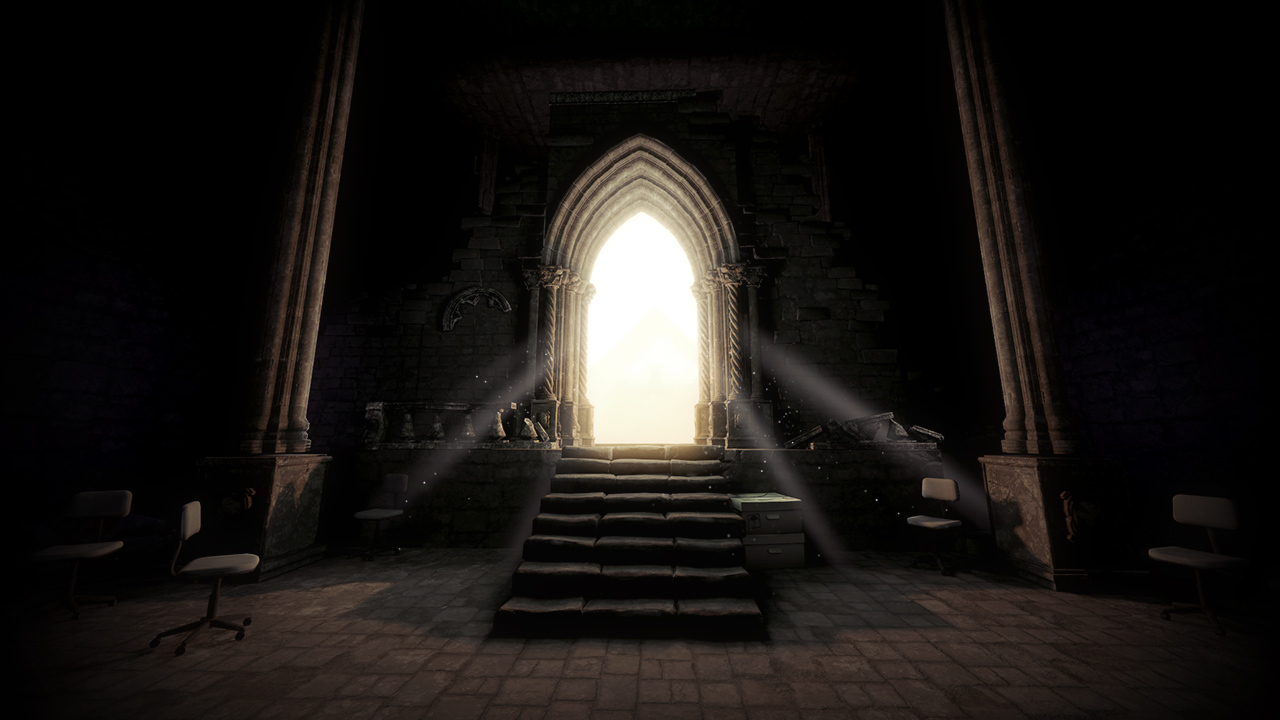It's incredibly bold to hide away a sequel to a game in an expanded re-release of the original experience. But when it comes to something as enjoyably strange and hilariously obtuse as The Stanley Parable, it makes sense--in fact, my belief that The Stanley Parable: Ultra Deluxe would be anything else seems fundamentally foolish in hindsight.
Ultra Deluxe is as intriguing to play as the original game, perhaps even more so today given that its message is directed toward the modern-day gaming landscape. Some of the nuances will be a bit lost on you if you weren't playing games or at least paying attention to the space back in 2013, as it relies on having a grasp of how the conversation surrounding games has evolved in the past decade. But, it's an entertaining experience regardless of if you have that context or not.
Though it's presented as a kind of director's cut of the original, Ultra Deluxe feels more like a sequel that exists within The Stanley Parable. You're still kicking things off by embodying the role of Stanley, an employee with the meaningless role of sitting in a drab office and staring at his computer screen all day, pushing the buttons on his keyboard that he's told to. And then one day his screen stops telling him what to do, gifting him with the freedom to listen to the overbearingly haughty narrator that oversees his every move or to do as he wishes instead.
Of course, it's not really freedom. When given the option of walking through a door to the left or the right, Stanley isn't being given an option at all--he's being funneled down one of two possible paths, each of which can branch into several predetermined outcomes. Upon reaching any of these conclusions, the game resets to the beginning, allowing you the chance to try a new path and uncover another outcome.
It's all meant to reflect the illusory sense of choice the player is presented with when they play any game that's advertised as a "choice-driven narrative." This was a far more intriguing narrative set-up back in 2013, when such self-reflection in video games wasn't entirely common and the game design choices it commented on were more prevalent. In 2022, it now feels like we've already had this conversation. The industry has since built upon this topic to create games that comment on a specific experience through some level of retrospection on the theme of choice and how it works within a medium where the recipient of the message isn't a passive observer--like the notion of code-switching and adopting new speech patterns in Signs of Sojourner or investigating power and privilege through varying degrees of autonomy in Disco Elysium.

I wouldn't go so far as to say that this makes the opening minutes of Ultra Deluxe boring, but it isn't a great first impression for first-timers either, given how outdated the commentary can feel. For a little while at least, you're just playing the original game--which is no longer as unique as it once was--making the opening runs through Ultra Deluxe feel a bit outdated.
Thankfully, you can just skip straight to the new content if you want, with the game giving you the option right off the bat. If you choose not to you'll need to play through The Stanley Parable a number of times and see a few of its different endings in order to unlock the new content.
Much of the new content plays similarly to The Stanley Parable, allowing you to follow the narrator's instructions or do the opposite. You can press the button or not press the button. You can jump or not jump. You can carry the bucket or not carry the bucket (you should carry the bucket). Your choices will cause the story to branch, allowing you to reach several different endings--some are immensely entertaining variations on how the experience could already conclude in The Stanley Parable, while others are brand-new. All of them are rewarding to uncover, with some surprises tucked into a few.

The main crux this time around is how the illusion of choice is redirected to encompass the gaming industry more as a whole. Since 2013, the relationship between developers and players has changed, with bad faith players realizing they can weaponize social media to demand changes to games, and developers learning the never-before-needed skillset of balancing the desires of an insatiable playerbase and their own artistic vision when any possible change can potentially be achieved through an online update. It truly brings a brand-new, almost horrifying meaning to The Stanley Parable's tagline phrase "The end is never the end is never the end…"
It's a compelling concept to explore: The idea that whether a developer listens to their players is just as arbitrary as whether a player decides to go through the door they're told to when playing a game. The Stanley Parable sort of broached this back in 2013, when some of its endings implied that the illusory sense of choice in games could be extended to other forms of interactions, like your role in the workplace or conversations at home with your family.
Ultra Deluxe just focuses that idea on game development and then runs with it, delivering an experience that's hilariously funny, but can also be spooky or tragic. And I dare say that some of the new endings feel almost wistful. Regardless of their tone, what I've seen thus far has convinced me that I need to keep playing this game and see what other outcomes I can uncover.
To say any more about this game could potentially spoil some of its delightful surprises (of which there are many). The Stanley Parable: Ultra Deluxe has taken me on a rollercoaster of emotions--I'll be scratching my head in confusion one moment and then staring at my TV dumbfounded, my mouth agape in incredulous bemusement the next. As far as I can tell, there's no unifying mystery to solve here; nor is there any sort of indistinguishable moral lesson that the game is asking me to uncover. What is there, however, is an attractive lure for a thought-provoking experience about video games, and how our reception of them has evolved.







